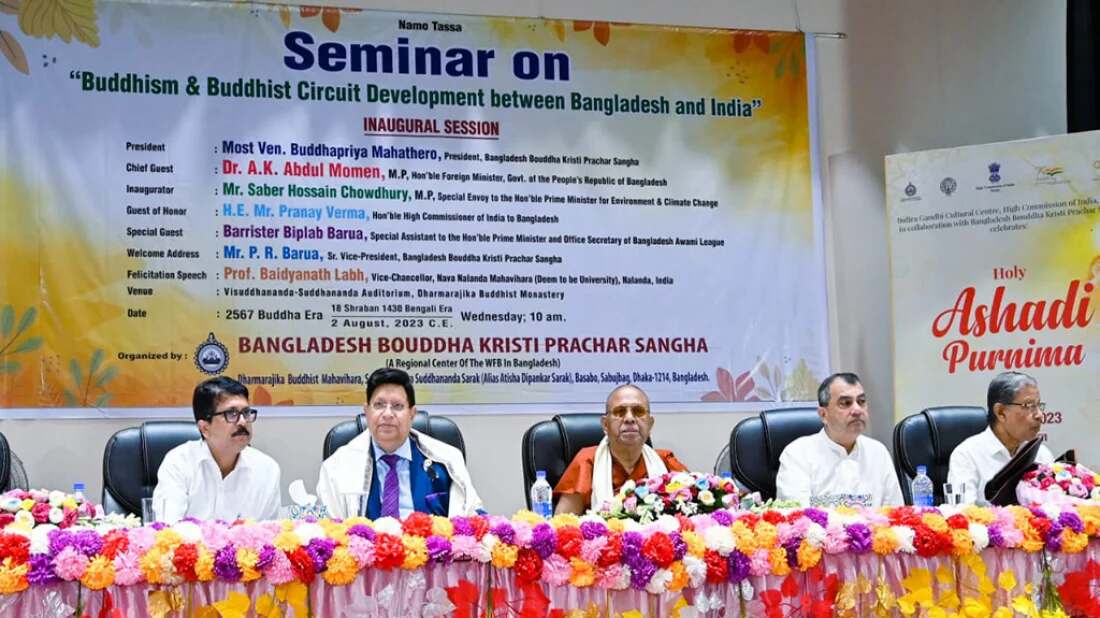
In order to further “enhance friendship and understanding,” Bangladeshi Foreign Minister Dr. AK Abdul Momen offered five recommendations on Wednesday for the creation of a Buddhist circuit between Bangladesh and India.
He stated this while speaking at a seminar titled “Buddhism and Buddhist Circuit Development between Bangladesh and India” at the Dharmarajika Buddhist Monastery in Dhaka. “The teachings of Lord Buddha could be a good basis for a peaceful society and peaceful region,” he remarked.
“The connection between Indian and Bangladeshi Buddhism cultures may serve as a catalyst for expanding friendship and understanding, especially in the field of people-to-people exchange. Travelling pilgrims establish ties and make memories that transcend national boundaries. By encouraging respect and admiration for many beliefs and traditions, these exchanges help to advance secularism, he said.
The foreign minister has made the following five concrete suggestions in this regard:
1. In order to promote “bonding and friendship” across the nations, we must use Buddhism and its history as a tool. The preservation, advancement, and promotion of these legacies are therefore still essential. This is important for everyone who wants to learn about the rich history and diverse cultures of South Asia, not just for spiritual adherents.
2. To release the potential of the region’s Buddhist legacy for inclusive development, we must cooperate bilaterally as well as at the regional level within South Asia and across Southeast Asia.
3. We must intensify efforts within regional organisations like Saarc and Bimstec to study strategies for preserving and promoting the region’s cultural variety, particularly through fostering a Buddhist circuit. In this aspect, creating a strong Buddhist circuit can be a catalyst.
4. To ensure sustainable tourism development that complements the broader sustainable development of the region, we must create a collaborative effort.
5. Hold recurring regional forums and conferences on South Asian tourism development and cultural heritage to exchange knowledge, best practises, and difficulties relating to protecting and promoting Buddhist history. The appropriate function can be played by think tanks and various religious organisations.
Why Buddhism?
With more than 520 million adherents worldwide, or more than 7% of the world’s population, Buddhism is the fourth most popular religion. Buddhism is based in great part on the original teachings credited to the Buddha and his ideas, and it has a wide range of traditions, beliefs, and spiritual practises.
In Bangladesh, there are roughly a million Buddhists. They make up around 0.6% of Bangladesh’s overall population. The Chittagong Hill Tracts area is home to the majority of Buddhists—more than 65% of them.
According to the foreign minister, Buddhism has a rich cultural history and plays a key role in South Asian society. It is acknowledged that South Asia is where Buddhism originated.
“Friendly relations between India and Bangladesh have a long history and are firmly based in our common tradition and culture. Since Buddhism is ingrained in both of our cultures, it creates opportunities for interaction. I firmly believe that the growth of Buddhist circuits between Indian and Bangladeshi Buddhists will strengthen the bonds and people-to-people contact between the two nations,” he remarked.
Atish Dipankar, a famous Buddhist scholar who travelled to Tibet to spread Buddhism there and is still revered by the Tibetan people, was born in Bangladesh. Many Buddhist archaeological sites and monuments may be found in Bangladesh, which was formerly known as the ancient kingdom of Pundravardhana.
From the venerable Mahabodhi Temple in Paharpur to the historic monastery buildings in Mahasthangarh, these treasured structures serve as a reminder of the enormous influence Buddhism had on this area. The acknowledgment of this Buddhist past becomes a crucial component of our identity as we take pride in our cultural variety, he continued.
The rich Buddhist tradition of India, which extends back more than two millennia, is also well-known. More than 2,500 years ago, Siddhartha Gautama, the Buddha, acquired enlightenment in Bodh Gaya, which is where Buddhism first emerged. Buddhism’s teachings have since permeated the area and beyond, permanently altering the cultural landscape. India, the cradle of Buddhism, is home to many revered Buddhist sites and monuments, according to the foreign minister.
Peaceful coexistence Buddha, according to Dr. Momen, was a torchbearer for humanity and peace. In his illustrious speech to the UNGA in 1974, Bangabandhu Sheikh Mujibur Rahman emphasised the significance of peace for humanity’s survival.
On May 23, 1973, Bangabandhu received the Joliot-Curie Medal of Peace for his efforts to advance human rights and world peace, he claimed.
“Bangabandhu always held that progress depends on maintaining peace. Bangladesh adopted Bangabandhu’s worldview and became a fervent supporter of international peace. Prime Minister Sheikh Hasina, his daughter, is also devoted to promoting world peace and prosperity for everybody. She advocated for the UN resolution “Culture of Peace.” It holds that all acts of hostility, terrorism, and war result from an attitude of intolerance and disdain for others,” he stated.
Buddha, according to Dr. Momen, was a torchbearer for humanity and peace. In his illustrious speech to the UNGA in 1974, Bangabandhu Sheikh Mujibur Rahman emphasised the significance of peace for humanity’s survival.
On May 23, 1973, Bangabandhu received the Joliot-Curie Medal of Peace for his efforts to advance human rights and world peace, he claimed.
“Bangabandhu always held that progress depends on maintaining peace. Bangladesh adopted Bangabandhu’s worldview and became a fervent supporter of international peace. Prime Minister Sheikh Hasina, his daughter, is also devoted to promoting world peace and prosperity for everybody. She advocated for the UN resolution “Culture of Peace.” It holds that all acts of hostility, terrorism, and war result from an attitude of intolerance and disdain for others,” he stated.

















